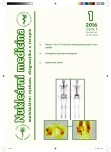-
Medical journals
- Career
Scintigraphic detection of hemangioma – case report
Authors: Iva Štufková 1; Otto Lang 1,2
Authors‘ workplace: Oddělení nukleární medicíny, Oblastní nemocnice Příbram, a. s., ČR 1; Klinika nukleární medicíny, 3. LF UK a FN Královské Vinohrady, Praha, ČR 2
Published in: NuklMed 2016;5:10-14
Category: Casuistry
Overview
Aim:
To detect the extent of congenital cutaneous hemangioma.Methods:
We performed a detection of hemangioma using erythrocytes labeled in vitro with 99mTc. Images were performed with a gamma camera Symbia T (Siemens). We performed a dynamic study for one hour following injection, static and SPECT/CT images followed after 1 and 2 hours.Results:
We presented a case report of a 25-y-old woman with congenital hemangioma located to the right dorsal side of the body. Nephrectomy of the right kidney due to hemangioma was performed at the age of 3 years. She felt a pain around cutaneous changes for last 6 months. She was sent to scintigraphy for the detection of the extent of involved skin area and the exclusion of an involvement of other organs. We detected multiple lesions of increased accumulation of labeled erythrocytes at the lower dorso-lateral area of the thorax and abdomen on the right side in the skin and subcutaneously penetrating to the muscles of the thoracic and abdominal wall. There were at least 5 foci of irregular shape. The biggest one is 5 cm on average and others 2 to 3 cm. This image was typical for multiple hemangiomas. We did not detect any involvement of adjacent organs including spine.Conclusion:
This examination revealed several other deeply located hemangiomas except of known cutaneous location. Abdominal organs and spine were not involved. Our case report demonstrates appropriateness of this method to detect the extent of hemangioma.Key Words:
hemangioma, SPECT/CT, 99mTc labeled erythrocytes
Sources
1. Šimsová M, Kocmichová B. Hemangiomy a lymfangiomy, Sanquis 2003;27 : 34
2. Adam Z, Křikavová L, Krejčí M, et al. Léčba mnohočetné angiomatózy postihující skelet, břišní i hrudní dutinu interferonem α, thalidomidem a zoledronátem. Vnitř Lék 2008;54 : 653-664
3. Mulligan PR, Prajapati HJS, Martin LG, et al. Vascular anomalies: classification, imaging characteristics and implications for interventional radiology treatment approaches. Br J Radiol 2014;87 : 20130392
4. Yarlagadda R, Menda Y, Graham MM. Tc-99m Red Blood Cell Imaging in a Patient With Blue Rubber Bleb Nevus Syndrome. Clin Nucl Med 2008;33 : 374-376
5. Front D, Israel O, Groshar D et al. Technetium-99m-labeled red blood cell imaging. Semin Nucl Med. 1984;14 : 226-250
6. Kotlyarov EV, Mattay VS, Reba RC. Gallbladder Visualization During Technetiuim-99m RBC Blood Pool Imaging. Clin Nucl Med 1988;13 : 515-516
7. Hedge SV, Dillman JR, Lopez MJ, et al. Imaging of multifocal liver lesions in children and adolescents. Cancer Imaging 2012;12 : 516-529
8. Toro A, Mahfouz AE, Ardiri A, et al. What is changing in indications and treatment of hepatic hemangiomas. A review. Annals of Hepatology 2014;13 : 327-339
9. Phillpott J, Ali S, Briscoe E, et al. Three-Phase Tc-99m Labeled RBC Scintigraphy of a Splenic Hemangioma. Clin Nucl Med 1997;22 : 158-160
10. Fukuda Y, Murata Y, Umehara I, et al. Perfusion and Blood Pool Scintigraphy for Diagnosing Soft Tissue Arteriovenous Malformations. Clin Nucl Med 1999;24 : 232-234
11. Jolepalem P, Grigore C, Palka JC. Scintigraphic Evaluation of a Suspected Cavernous Hemangioma. J Nucl Med Technol 2012;40 : 290-292
12. Shih W, Lee JK, Mitchel B. False-Positive Results for Hepatic Hemangioma on Tc-99m RBC SPECT Caused by a Liver Metastasis From Small-Cell Lung Carcinoma. Clin Nucl Med 1996;21 : 898-899
13. Krishnamurthy GT, Krishnamurthy S. Nuclear hepatology: a textbook of hepatobiliary diseases. Springer-Verlag Berlin Heidelberg 2000, 291 p
14. Adams BK, Al Attia HM. Technetium-99m labelled red blood cell blood pool imaging versus contrast venography in a patient with extensive blue rubber bleb naevi. Postgrad Med J 2003;79 : 538
Labels
Nuclear medicine Radiodiagnostics Radiotherapy
Article was published inNuclear Medicine

2016 Issue 1-
All articles in this issue
- Reflection of introduction and application of PET/MR hybrid imaging systems in the Czech Republic
- Hydroxyapatites in nuclear medicine
- Preparation of hydroxyapatites lebelled with 223Ra and 99mTc and their in vitro stabililty
- Scintigraphic detection of hemangioma – case report
- Flare phenomenon in patient with breast cancer
- Nuclear Medicine
- Journal archive
- Current issue
- Online only
- About the journal
Most read in this issue- Flare phenomenon in patient with breast cancer
- Scintigraphic detection of hemangioma – case report
- Reflection of introduction and application of PET/MR hybrid imaging systems in the Czech Republic
- Preparation of hydroxyapatites lebelled with 223Ra and 99mTc and their in vitro stabililty
Login#ADS_BOTTOM_SCRIPTS#Forgotten passwordEnter the email address that you registered with. We will send you instructions on how to set a new password.
- Career

